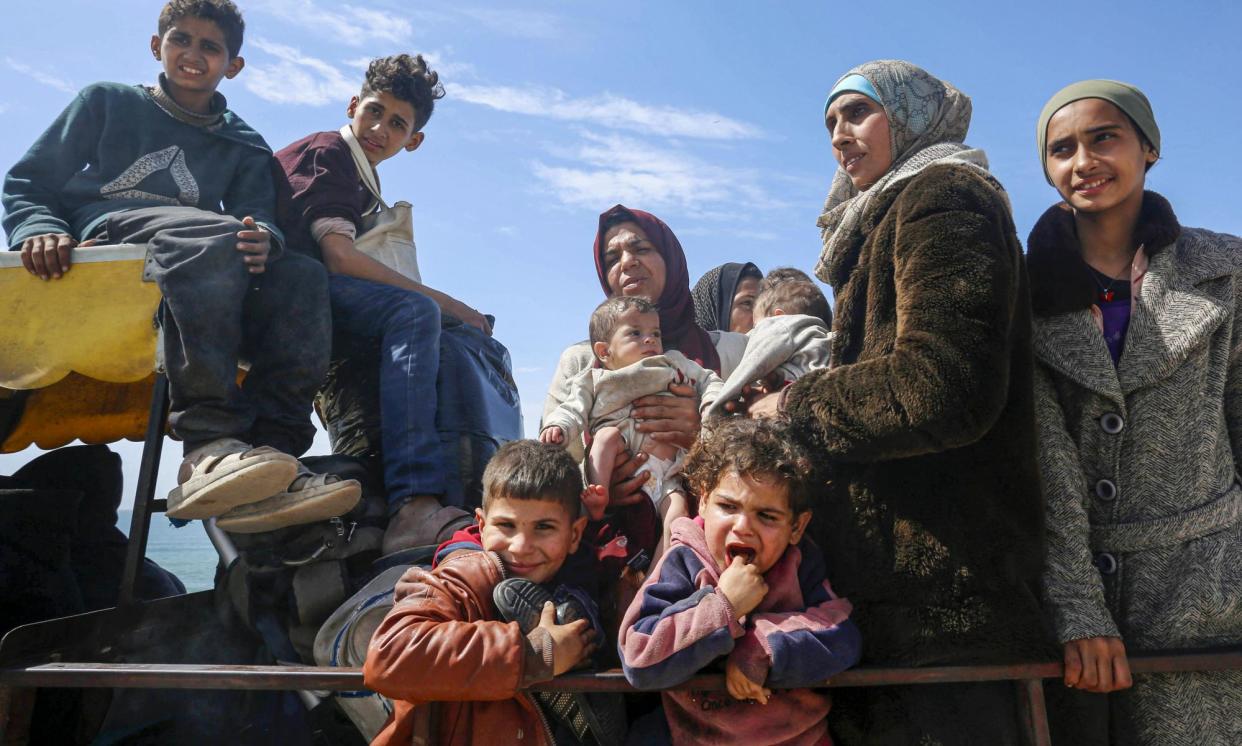What did US Gaza ceasefire resolution say and why did Russia and China veto it?

After months of vetoing other UN security council resolutions in an effort to defend Israel’s military campaign in Gaza, the US has in recent weeks gone on to the diplomatic front foot in New York, drafting and tabling its own resolution that was put to a vote on Friday before being vetoed by Russia and China.
The US secretary of state, Antony Blinken, said the resolution would send “a strong signal”. But what was that signal precisely?
What did the US resolution say?
The opening wording on an immediate ceasefire was complex, even convoluted. It urged the UN to “determine the imperative for an immediate and sustained ceasefire to protect civilians on all sides, allow for the delivery of essential humanitarian assistance, and alleviate humanitarian suffering”.
It thereby supported “diplomatic efforts to secure such a ceasefire in connection with the release of all remaining hostages”. The US’s critics, including Russia, noted the text did not explicitly use the word “call” in terms of a ceasefire. It also implied the ceasefire would be conditional on the release of all hostages. The text marked an important tonal shift for the US, since previously the US had called for a ceasefire as soon as practicable, but the change was not as substantive as some headlines suggest.
Related: US resolution on Gaza ceasefire vetoed at UN by Russia and China
What happened in the vote?
The US claimed its draft had the support of at least nine of the 15-strong security council members, enough for the vote to pass so long as no veto was wielded by one of the five security council members. In the end it secured 11 votes, but three voted against including the veto-wielding Russia and China. Guyana abstained.
Why did Russia and China veto?
The Russian deputy ambassador to the UN, Dmitry Polyanskiy, warned reporters on Thursday: “We are not satisfied with anything which doesn’t call for an immediate ceasefire.”
After the vote, he said: “At the coordination stage, almost all security council members expressed the view that the demand for an immediate ceasefire should not be conditional on the release of hostages or the condemnation of Hamas.”
He argued that the effect of making a ceasefire conditional on the release of all hostages would be to endorse leaving hundreds of thousands of innocent Palestinian civilians exposed to continued Israeli attacks until the point when Hamas and Isreal reached an agreement.
In the chamber, the Russian ambassador Vasily Nebenzya told the security council the resolution was a “hypocritical spectacle” that put no real pressure on Israel over its war crimes. Moscow also said the episode showed the US administration was more interested in throwing a bone to American voters and persuading a domestic audience it was being even-handed in the crisis.
Explaining Guyana’s abstention, the South American country’s representative Carolyn Rodrigues-Birkett said: “Contrary to media reports, this resolution does not call for an immediate ceasefire.”
She also added the demand that a ceasefire should not be linked to or conditioned on the release of hostages. “Two wrongs cannot make a right and the Palestinian people should not be collectively punished and themselves held hostage for the crimes of others.
“If one were to read this resolution without background knowledge, it would be difficult to ascertain which party in this conflict is committing the atrocities in Gaza – atrocities which necessitated this draft resolution being put forward. In a resolution of 41 paragraphs, 2,036 words, the occupying power is mentioned once in the penultimate paragraph.”
Would it have mattered?
Yes. Diplomatically, the US would have benefited from showing some positive leadership at the UN and demonstrating it is not as isolated as it has appeared in its support for Israel. The bulk of the operational part of the text was directed at Israel without being explicit in those criticisms. It reiterated calls for aid to flow faster, including by opening more land crossings and fewer restrictions on goods allowed to enter Gaza. It opposed the forcible displacement of Palestinians, and the creation of buffer zones. It would have also been the first time that the UN collectively condemned Hamas by calling for restrictions on its finances.
But the resolution was silent on three contentious issues. In a clause directed at Israel, it urged all parties to cooperate with the investigations into the neutrality of the UN relief works agency Unrwa, but did not call for a return to funding of the agency at this stage. The future governance of Gaza was largely untouched save to give the UN special coordinator a clear role. It did not say if international humanitarian law was being breached.
What happens now the resolution has been defeated?
A rival draft resolution favoured by African states has been circulating that is more explicit about an immediate ceasefire, but this will not be put to the vote on Friday. France’s ambassador to the UN, Nicolas de Rivière, has said an alternative draft championed by the non-permanent members of the security council, calling for an immediate ceasefire in Ramadan, “will come to the table and put to the vote”. He said: “We need a ceasefire and then talks.”
But such are the entrenched divisions in the security council that this resolution is also likely to be killed – this time by a US veto, potentially the fourth of this conflict. For many observers, the episode will confirm that the security council is simply broken.


